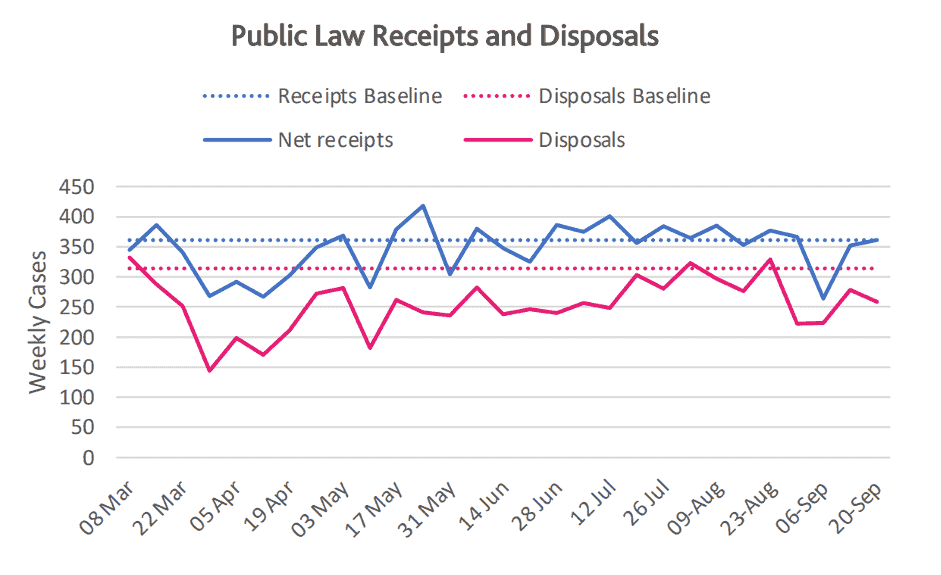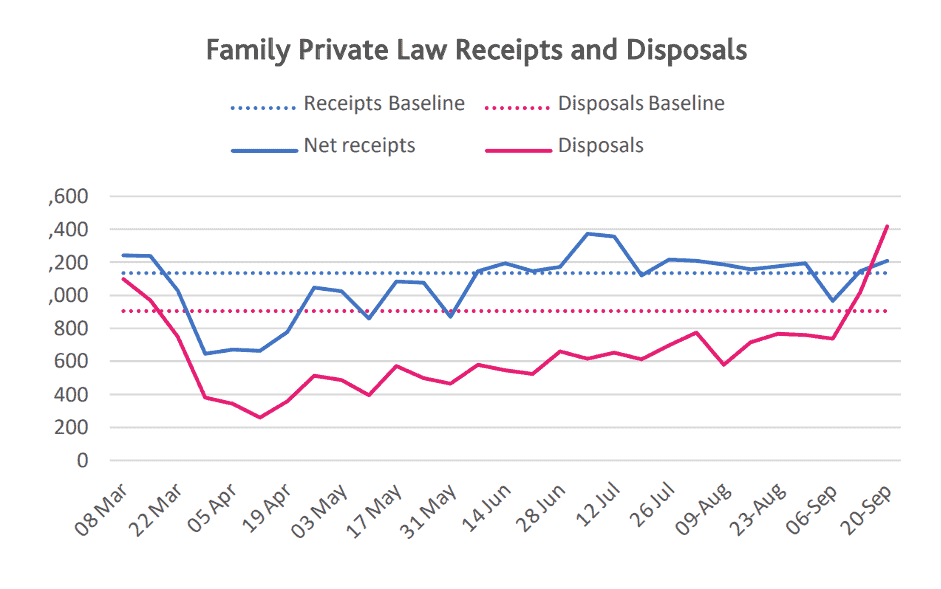“Throughout the crisis, we have supported the judiciary in their prioritisation of cases to ensure the most urgent cases could be heard, and supported the implementation of the President of the Family Division’s guidance on urgent cases and remote hearings which was issued on 19 March 2020.”
So say HM Courts and Tribunals Service in their latest (November 2020) recovery update in response to coronavirus.
On 2 December they held a webinar highlighting a number of ways in which the courts had improved their capacity to deal with cases remotely and start to reduce some of the mounting backlog of cases. (The event also covered civil courts and tribunals but this post focuses on the information about family courts.)
The point was made repeatedly that the system was already under strain before Covid-19 struck. The HMCTS update sets the scene:
“In recent years there has been a significant year-on-year increase in the number of people seeking to use the family justice system. We have expanded capacity in response, and the introduction of online services in probate, divorce and private law has helped to modernise our services and improve efficiency.”
The continual increase in new cases coupled with insufficient capacity in the courts and judiciary meant that ‘disposals’ were simply not keeping up with ‘receipts’ (ie new cases).
However, thanks to the leadership of the President of the Family Division, Sir Andrew McFarlane and his guidance (and perhaps also the guidance on remote access issued by Mr Justice MacDonald, with a lot of input from family law organisations and lawyers) the courts have managed to increase the number of sitting days, which HMCTS say are now at ‘record levels’.
“We were not able to sustain the same level of throughput from video and audio hearings as we had previously from face-to-face hearings, but we are now taking measures to improve performance through greater standardisation, training and additional administrative support.”
HMCTS say they made their integrated Cloud Video Platform (CVP) available from early on, and provided lots of training. This may be true, but we know from our own research that initially it was not regarded as sufficiently reliable for the judiciary to use, and many of them relied on other platforms, such as Microsoft Teams, Skype for Business, or even Zoom (popular, but not officially approved it seems).
The reliability of CVP was raised in the Q&A session at the end of the webinar and HMCTS assured us that CVP has improved, with performance “looking much better over the last few weeks”. The numbers of parties able to access it and the number of simultaneous hearings being managed have increased enormously, they say. Moreover, the help desk has also improved its ability to deal with any problems experienced.
The question of what form a hearing should take – whether in person, video or by telephone – remains a matter ultimately for the judiciary, and HMCTS say they will support the judges in providing whatever mode of hearing they want.
Divorce
Both applications for divorce and decree nisi pronouncements initially decreased, say HMCTS, but both have now broadly recovered to pre-COVID averages.
“The digital divorce service, where over 75% of applications are now made, has continued to operate within expected timescales throughout the pandemic as throughput has been sustained despite remote working. Processing of paper-based applications has been more challenging, and action has been taken to increase the capacity of the paper applications system with waiting times now reducing significantly.”
Public law cases
Here is a chart showing how public law family case disposals are struggling to catch up with receipts, seen against a baseline derived from previous years:
“In public family law, we saw both receipts and disposal initially decrease below pre-COVID baseline levels. Receipts quickly rebounded and have averaged 96% of pre-COVID levels since the start of the pandemic. Disposals have been slower to respond but are gradually returning to normal levels. They have averaged 80% of pre-COVID levels and remain some way below receipts. As a result, the number of outstanding cases has grown by 16% since the start of the pandemic up to 20 September 2020, albeit the increase in disposals and a data review of outstanding cases has slowed down the rate of increase in the backlog.”
Private family law cases
Here is a chart showing how private law case disposals are managing rather better than public law cases in catching with receipts.
“In private family law, there was initially a more pronounced decrease in both receipts and disposals, but receipts returned to normal quickly, averaging 95% of pre-COVID levels in the period to 20 September 2020. Disposals have been slower to respond. They have averaged over 70% of pre-COVID levels across the period of the pandemic but have gradually improved since April 2020. The backlog now stands at 19% above the level it was pre-COVID, although this larger backlog is in part a reflection of the prioritisation of more urgent public law work. A similar review of outstanding case data has reduced the backlog by around 2,000.”
Looking ahead
Demand in both public and private family law is expected to increase temporarily above pre-COVID norms, creating additional pressures on capacity, say HMCTS. “Our approach therefore is to sustain capacity in family and enhance throughput wherever possible.”
Although there has been an increase in judicial sitting days, there is expected to be “some rebalancing of salaried judicial time back towards the civil courts”, and HMCTS will therefore be “looking to secure fee-paid judicial sittings” (ie lawyers sitting as part-time judges) “to achieve planned sitting levels and potentially more”.
“We are also focusing on increasing the amount of family work by magistrates and district judges (magistrates’ court) where sittings have been around 65% and 55% of planned levels respectively to date this financial year.”
HMCTS say there are “currently no plans to introduce COVID Operating Hours in the family court, but this will be kept under review”.
Finally, although “remote hearings will continue to play an important role in enabling hearings to take place which otherwise would not be possible”, HMCTS expects “more hearings to be completed face-to-face as more courtrooms become available, in line with expectations set out by the President of the Family Division in his Road Ahead framework.”
We have a small favour to ask!
The Transparency Project is a registered charity in England & Wales run largely by volunteers who also have full-time jobs. We’re working hard to secure extra funding so that we can keep making family justice clearer for all who use the court and work within it.
We’d be really grateful if you were able to help us by making a small one-off (or regular!) donation through our Just Giving page.
Thanks for reading!
Featured image taken from COVID-19: Overview of HMCTS Recovery for Civil and Family Courts and Tribunals (November 2020)


